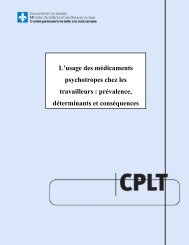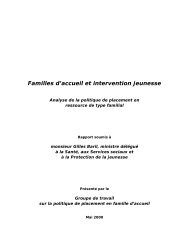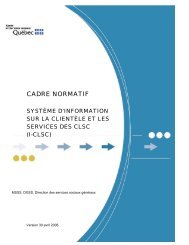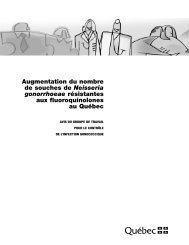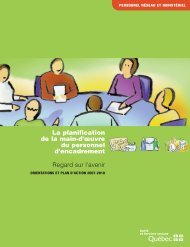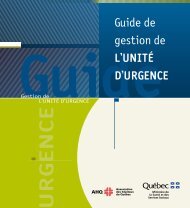De l'innovation au changement - Gouvernement du Québec
De l'innovation au changement - Gouvernement du Québec
De l'innovation au changement - Gouvernement du Québec
Create successful ePaper yourself
Turn your PDF publications into a flip-book with our unique Google optimized e-Paper software.
Projet 19<br />
<strong>De</strong>velopment and Evaluation of Cultural Consultation Service in Mental Health, région de Montréal<br />
Développement et évaluation d'un service de consultation culturelle en santé mentale<br />
and, (iii) to provide specialized teams with cultural knowledge and language skills essential to work with patients who require a high level of<br />
expertise to diagnose and treat their problems.<br />
An explicit and long term commitment on the part of regional health and social service <strong>au</strong>thorities and health care institutions to the ideals of<br />
cultural competence in health care and to a meaningful response to improving the quality of services for a culturally diverse population.<br />
A willingness to work closely with representatives of ethnocultural communities and community organizations to identify unmet needs and<br />
potential resources for the delivery of cultural appropriate mental health care.<br />
The process of implementation involves identifying core staff with the requisite skills and obtaining infrastructure support (offices, secretarial<br />
support, telecommunications, computers).<br />
While there are grassroots community initiatives that address the mental health needs of immigrants and refugees, there remains a significant<br />
lack of co-ordination of resources as well as a lack of a coherent structure to manage the needs of an increasingly diverse population. As well,<br />
there are too few clinical consultants available to support primary care and frontline workers in the community.<br />
The ability to fund professionals and non-professionals with cultural expertise (culture brokers) provided by the Health Transitions grant<br />
dramatically increased the capacity of the service to provide appropriate interventions.<br />
6.3 Avantages généralisation The findings from this project are important bec<strong>au</strong>se (a) they indicate significant unmet need for mental health services for Aboriginal peoples,<br />
immigrants, refugees and asylum seekers and (b) bec<strong>au</strong>se they suggest some effective means of responding to these needs by developing<br />
additional services, providing ongoing training within clinical institutions, and by training and supporting professionals to make systematic use<br />
of their linguistic and cultural expertise.<br />
The specialized teams in transcultural psychiatry facilitated access to services in several ways: 1) they provided service for under-served<br />
populations who usually do not receive ; 2) for patients already receiving mental health care, they providing links to clinicians, interpreters,<br />
culture-brokers and community organizations with knowledge and expertise in working with specific ethnocultural groups; 3) by providing<br />
access to specialized consultation that increases the knowledge and skill («know how») of clinicians in diverse milieus, the service<br />
immediately improved the quality of care of patients; 4) by creating a place for clinical training of professionals from different disciplines who<br />
can use transcultural perspectives in their subsequent practice milieus the services contribute to the development of new resources.<br />
The development of a specialized resource also brought with it certain problems: 1) the development of a sensitivity to cultural questions leads<br />
to an increase in demands, exceeding the capacity of the team; 2) the subsequent tightening of criteria for admission re<strong>du</strong>ced accessibility to<br />
the services the team while increasing the bure<strong>au</strong>cratic quality of the process which harms the alliance with a vulnerable population.<br />
There were significant changes in service use, diagnosis and treatment in indivi<strong>du</strong>al cases that will have dramatic impact both on their long<br />
term wellbeing and functioning and on the ultimate costs of their care to the health and social service systems.<br />
In several cases patients who had not been receiving any effective treatment for their conditions were accurately diagnosed and enrolled in<br />
appropriate treatment. In some cases, this involved children who had been incorrectly diagnosed <strong>du</strong>e to a lack of use of interpreters and<br />
cultural expertise and who had treated for years with inappropriate medications and other interventions.<br />
101





